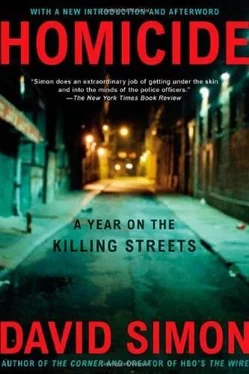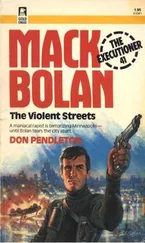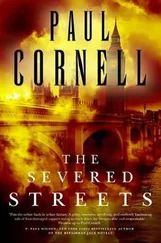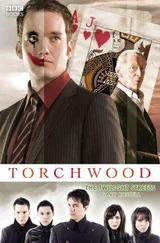As the state nears the end of its presentation, the courtroom observers are divided in their opinion about which side is winning. Doan has laid his foundation and guided Romaine Jackson successfully through her precious testimony. But Polansky has done well at points, too, and his deft use of Vincent Booker may be enough to sway the jury. But Doan isn’t quite finished. He surprises Polansky with one last witness, a witness the defense attorney did not expect to see used against his client.
“Your honor,” says Doan, after the jurors have been dismissed for the day’s lunch hour, “I would request that Sharon Denise Henson, once she is called, be called as a court’s witness.”
“Objection!” says Polansky, almost shouting.
“Your reasons for saying, Mr. Doan,” asks Gordy, “in light of the objection?”
The prosecutor recounts Robert Frazier’s attempt to use his second girlfriend as an alibi in the murder of his first, as well as the detectives’ subsequent interrogation of Nee-Cee Henson, in which she admitted that Frazier had left her dinner party early and then failed to return until morning. Henson signed a written statement to that effect and then gave similar testimony to the grand jury; now, with Frazier looking at the possibility of life without parole, she is backing up, telling Doan that she remembers the dinner party more clearly now. Frazier, she says, left for only a few moments early in the evening and then stayed with her until morning.
The woman began backing away from her testimony weeks ago, when she first signed a written statement for a private investigator employed by Polansky. Her behavior does not surprise Doan, who has learned that she has repeatedly visited Frazier at the city jail. Now he asks Gordy to call her to the stand as a hostile witness. To the prosecutor, Sharon Henson is valuable precisely because her testimony will not be credible.
“It would be an injustice for this jury to be deprived of seeing her and hearing from her,” says Doan, “and it would put the state in an impossible position to actually call her as its own witness.”
“Mr. Polansky?” asks Gordy.
“Your honor, would it be possible to respond… to respond to Mr. Doan’s argument after the break so I can have an opportunity to absorb this?”
“Denied.”
“Can I have a minute to look at this?” he says, scanning a copy of the state’s motion.
“You may,” says Gordy, the very picture of bored irritation. “While Mr. Polansky is looking at that, I will note for the record this issue has been anticipated in this trial, according to conversations between counsel and the court, since the beginning of this trial.”
Polansky takes a few more minutes, then attempts a response, arguing that Miss Henson’s current version of events doesn’t differ dramatically from her earlier testimony. It doesn’t seem, Polansky argues, that the statements are so inconsistent as to justify calling her as a court’s witness.
“Do you intend to call her as a witness in the defense case?”
“Well, I don’t know,” says Polansky. “I can’t make that commitment at this point, your honor.”
“Because if you were, these questions would be moot.”
“I agree,” says the defense attorney. “I think the likelihood is I will not call her.”
Gordy then announces his decision: Although she is lying to save her man, Sharon Henson will testify against him. The woman takes the stand after the lunch break and begins an ordeal that lasts well over an hour. If a man’s freedom wasn’t at issue, if a family wasn’t seated in the gallery, praying for vengeance, Henson’s performance in service of her boyfriend might count as comedy. Black velvet evening dress, pillbox hat, fur wrap-her appearance alone makes it difficult to take her testimony seriously. Conscious of her big moment in this drama, she takes the oath and crosses her legs in the witness box as if to mimic the femme fatales of every Grade B film noir. Even the jury begins to giggle.
“How old are you, ma’am?” asks Doan.
“Twenty-five.”
“Do you know an individual by the name of Robert Frazier?”
“Yes, I do.”
“Do you see that individual in the courtroom today?”
“Yes.”
“Point him out, please.”
The woman points to the defense table, then, for just a moment, smiles softly at the defendant. Frazier looks back impassively.
Doan establishes Sharon Henson’s relationship with Frazier for the jury’s benefit, then takes her back to the night of her party and the murder. In her statements to Garvey and the grand jury, Henson acknowledged that she had been drinking and using drugs, but she had unequivocally stated that Frazier had left the party late that evening and not returned until morning. Now, she is remembering something altogether different.
“Do you still consider yourself Mr. Frazier’s girlfriend today?” asks Doan.
“Do I really have to answer that?”
“Yes,” says Gordy. “Answer the question.”
“Yes, I do.”
“And during the time that Mr. Frazier has been incarcerated you have visited him at the jail, have you not?”
“Yes, I have.”
“Now, how many times have you visited him there?”
“Three times.”
Doan heaps it on, asking Henson to list the Valentine’s Day gifts she received from Frazier before the murder. Then he turns abruptly to the issue of the.38 revolver that Frazier had given her to hold after the killing, the weapon that Frazier had taken back from her four days before Garvey and Kincaid showed up to interview her.
“And when he asked you for the weapon,” says Doan, his voice even, “did he tell you why he wanted it?”
“Yes, he did.”
“What did he say, ma’am?”
“That the police would be coming to talk to me, and he told them that I had the gun for him, but he didn’t ask me for it.”
“And?” asks Doan, looking up from his notes.
Sharon Henson glowers at the prosecutor before answering. “Not to give it to them,” she says, then glances apologetically toward her boyfriend.
“He told you that the police would be coming looking for it. He didn’t want you to give it to them?” asks Doan.
“I remember that, yeah.”
So far, so good. Doan pushes on to the night of the party. He has the woman recite the guest list and the menu, and when she claims poor memory, Doan reminds her that they spoke only ten days earlier in his office.
“At that time, did you tell me that you had ham and cheese, collard greens, corn on the cob, lobster and wine?”
“Yes,” she says, unperturbed.
Doan leads her into the events of the party: Frazier’s arrival, his departure to pick up the lobster, his wardrobe on the night of the party.
“What was Mr. Frazier wearing?”
“Beige.”
“Beige?”
“Beige,” she repeats.
“He had beige slacks on?”
“Uh-huh.”
“Beige shirt?”
“Uh-huh.”
“Did he have a jacket that he was wearing?”
“Coat,” she says.
“What kind of coat?” asks Doan.
“Beige,” she says.
“Was he wearing anything else beige?”
The jury laughs. Henson glares at them.
“His hat?” asks Doan.
“It’s like a golf cap.”
“The kind with a brim around the front?” asks Doan.
“Snaps on it,” she says, nodding in agreement.
Suddenly, Larry Doan turns the corner on Sharon Henson. He brings out her statement to the detectives as well as her grand jury statement.
“When you spoke to police, didn’t you tell them he was wearing a black waist-length jacket?”
“I spoke to the police,” she says, the change in Doan’s voice making her wary.
“Ma’am, is the answer yes or no?”
Читать дальше












